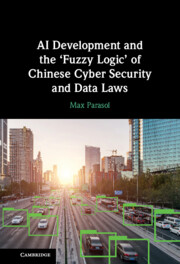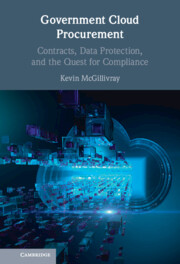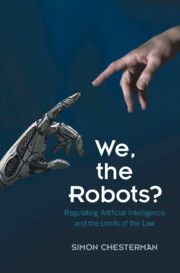AI Development and the ‘Fuzzy Logic' of Chinese Cyber Security and Data Laws
$130.99 (F)
- Author: Max Parasol, RMIT Blockchain Innovation Hub
- Date Published: December 2021
- availability: Available
- format: Hardback
- isbn: 9781316513361
$
130.99
(F)
Hardback
Other available formats:
Paperback, eBook
Looking for an examination copy?
If you are interested in the title for your course we can consider offering an examination copy. To register your interest please contact [email protected] providing details of the course you are teaching.
-
The book examines the extent to which Chinese cyber and network security laws and policies act as a constraint on the emergence of Chinese entrepreneurialism and innovation. Specifically, how the contradictions and tensions between data localisation laws (as part of Network Sovereignty policies) affect innovation in artificial intelligence (AI). The book surveys the globalised R&D networks, and how the increasing use of open-source platforms by leading Chinese AI firms during 2017–2020, exacerbated the apparent contradiction between Network Sovereignty and Chinese innovation. The drafting of the Cyber Security Law did not anticipate the changing nature of globalised AI innovation. It is argued that the deliberate deployment of what the book refers to as 'fuzzy logic' in drafting the Cyber Security Law allowed regulators to subsequently interpret key terms regarding data in that Law in a fluid and flexible fashion to benefit Chinese innovation.
Read more- Explains how China's innovation system works
- Discusses how Chinese entrepreneurs understand the ('fuzzy logic') innovation system
- Provides a clear roadmap for the prospects of China's AI development, within the bounds of China's data laws for the reader
Reviews & endorsements
‘In examining ‘fuzzy logic' in China's Cyber Security Law, this book provides invaluable insights into how China can be a powerful force in AI and tech innovation. It will have a significant impact on the way in which we conceive of technology regulation in China and elsewhere.
See more reviews‘As China navigates tensions between state control and the imperatives of innovation in internet technology, this book offers timely insights. It digs deeply into the 'fuzzy logic' of rules on data localisation, and frames a compelling argument that will help shape scholarly and policy debates in coming years.' Adam K Webb, Co-Director and Professor of Political Science, Hopkins-Nanjing Center
'The Chinese tech scene presents us with a bewildering picture of deeply intertwined technological, political and commercial questions and interests. This complexity equally affects Chinese policymaking, particularly in fields related to data and artificial intelligence. This volume aims to enlighten the way by which China gropes its way forward carefully, but decisively.' Rogier Creemers, Assistant Professor, Leiden University
'Parasol brings ground-up observations of how China's tech ecosystem really works, and skillfully integrates those with important insights from academia and beyond. He cuts right through the tired debates about whether China can innovate, and deftly illustrates how the 'fuzzy logic' of Chinese tech policy is enabling local experimentation that drives the ecosystem forward. Parasol's book provides excellent intellectual scaffolding for those of us trying to make sense of how Chinese tech got where it is today, and where it's going next.' Matt Sheehan, Fellow, The Paulson Institute
‘a timely, insightful and well-researched contribution to the literature on China and technology … Parasol’s fascinating book is likely to find its way onto postgraduate reading lists and presents ideas and hypotheses that can be tested and expanded in future scholarship.’ Tim Stevens, The China Quarterly
Customer reviews
Not yet reviewed
Be the first to review
Review was not posted due to profanity
×Product details
- Date Published: December 2021
- format: Hardback
- isbn: 9781316513361
- length: 340 pages
- dimensions: 236 x 159 x 29 mm
- weight: 0.763kg
- availability: Available
Table of Contents
Part I. Historical and Doctrinal Background:
1. Innovating in china's entrepreneurial ecosystem
2. The extent of fuzzy logic: the tech giants and their 'illegal' legal structure
3. China's cyber policies: conflict between innovation and restriction
4. China's data security policies leading to the cyber security law
5. The cyber security law: fuzzy logic in a touchstone law
Part II. Impact on Artificial Intelligence:
6. the impacts of data localisation on globalised ecosystems and Chinese tech development
7. How fuzzy provisions in the cyber security law protect data but not data privacy: 'data protection shall not hinder AI'
8. Why the current state of AI research is perfectly suited to China's fuzzy logic system
9. Open-source Ai platforms and the cyber security law
Conclusion — effect of data localisation on Chinese AI innovation.
Sorry, this resource is locked
Please register or sign in to request access. If you are having problems accessing these resources please email [email protected]
Register Sign in» Proceed
You are now leaving the Cambridge University Press website. Your eBook purchase and download will be completed by our partner www.ebooks.com. Please see the permission section of the www.ebooks.com catalogue page for details of the print & copy limits on our eBooks.
Continue ×Are you sure you want to delete your account?
This cannot be undone.
Thank you for your feedback which will help us improve our service.
If you requested a response, we will make sure to get back to you shortly.
×




